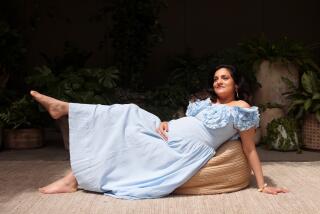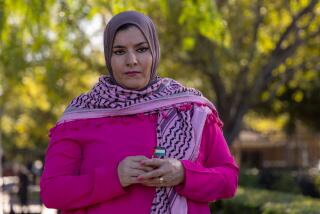She dreams of being a Muslim Woody Allen
- Share via
Zarqa Nawaz aims to set the world straight about one thing: Just because a woman wears a head scarf doesn’t mean she has no sense of humor.
The 35-year-old Canadian filmmaker describes herself as a conservative Muslim who covers her hair, prays five times daily and is active in her local mosque.
But she is also a quirky storyteller whose madcap farces about North American Muslim life have created a huge buzz in the Muslim community and on some college campuses in Canada and the United States.
“I make ‘terrodies,’ or comedies about terrorist themes,” Nawaz says with the deadpan delivery of a practiced stand-up. “You have dramedies. And these are terrodies, a new film genre which I feel I have created.”
And with her shoestring company, FUNdamentalist Films -- its slogan is “putting the fun back in fundamentalism” -- she says she’s working toward her breakthrough as a Muslim Woody Allen. “The time is right,” she says. “The marketplace has never been this curious about Muslims.”
Nawaz’s first endeavors -- film shorts “BBQ Muslims” (1996) and “Death Threat” (1998) -- were well-received, although she did get complaints from foreign-born Muslims who didn’t get the humor.
Now she’s seeking a producer for “Real Terrorists Don’t Belly Dance,” a full-length comedy she is convinced will be her crossover hit. The screenplay is about a Muslim couple whose lives collide when the groom, a struggling actor, takes a job playing an Arab terrorist so he can afford an engagement ring. Things fall apart when his fiancee is hired by a Muslim advocacy group trying to shame the film’s investors into dropping the project.
“I believe it’s going to catch everyone by surprise the same way that ‘My Big Fat Greek Wedding’ did,” she says.
Making waves
Say what you will about her work, Nawaz has confidence, or what her hero, Allen, might call chutzpah.
In many ways, she represents the other Islamic revolution: a movement of second-generation North American Muslims, who were weaned on Western popular culture as well as the Koran and who are assured and well-educated. Many are now making waves in art and academia.
Of course, other artists have mined ethnic heritage before her. Nia Vardalos rode the juggernaut of “Greek Wedding” straight from her native Winnipeg to Hollywood. And comedies set within particular subcultures, like “Monsoon Wedding” and “Bend It Like Beckham,” have been sleeper hits in the United States and Canada.
But Nawaz’s work is edgier because it serves up social criticism alongside satire at a time of undeniable curiosity -- but also paranoia -- about all things Muslim.
Whether Nawaz’s work will find a wide audience, however, remains to be seen. She is largely unknown in the U.S., and the competition for money by independent filmmakers is intense.
Nawaz’s first film, “BBQ Muslims” -- inspired by her anger at the finger-pointing at Muslims after the 1995 Oklahoma City bombing -- was about a pair of Muslim brothers suspected of being Middle Eastern terrorists after their backyard barbecue explodes.
“This bombing has all the markings of Muslim fundamentalists: a large hole in the ground, charred grass and dead animals,” says a radio news announcer at the film’s start.
Next came “Death Threat,” inspired by the religious edicts against writers Salman Rushdie and Taslima Nasrin. That film is about an aspiring Muslim novelist who fakes her own death threat to generate interest in her first novel, a pulp romance, “The Unquenched Wench of Moose Jaw, Saskatchewan.”
Both films skewer not only Western stereotypes of Muslims and extremist interpretations of Islam but also the conventions of middle-class Canadian Muslim culture. Both were crowd-pleasers when they premiered at the Toronto International Film Festival in 1996 and 1998.
Strong reactions
But while Nawaz’s films are popular in some circles, they have also provoked strong negative reactions.
Nawaz describes how an older man from South Asia stormed up to her after a screening at a meeting of the Islamic Society of North America in May.
“ ‘In my eyes,’ he said to me, ‘you’re no better than Salman Rushdie,’ ” Nawaz recalls.
He was livid that she had portrayed men dressed as pious Muslims holding what appeared to be a large gun.
“I said to him, ‘No, but don’t you see? The gun turned into a coat rack,’ ” Nawaz recalls explaining. “I was playing with that stereotype and, literally, turning it upside down.”
Eventually, she was able to calm the man down.
“But it was a real eye-opener to me,” Nawaz says. “He didn’t get the humor at all. It was partly a language problem and partly a cultural problem. I’m finding that I’m a real novelty in my own community. There just aren’t a lot of people in it who’ve gone out and made satirical comedies.”
Even her parents, who are Pakistani-born, watch her films without cracking a smile, she says. “For my parents’ generation, this type of humor is difficult to understand because it’s satire. And I’m finding that satire is very culturally defined.”
Inspired by a friend studying journalism, she applied and was accepted into the journalism program at Ryerson University in Toronto. “The writing came naturally,” she recalls. “It was clearly where my talents lay.”
After working for a while as a writer and producer for the Canadian Broadcasting Corp., she enrolled in a three-week workshop in filmmaking at the Ontario College of Art in summer 1995. She has never looked back.
“Norman Jewison, a famous Canadian director, said that film is the literature of this generation,” she says. “That really resonated with me. My dream is to make a film significant enough to change someone, even in a small way.”
Surviving by her wit
While Nawaz’s filmmaking style is satiric, her personal manner is anything but biting. Speaking by phone from her parents’ kitchen in Toronto, where she is visiting with her four young children, she radiates warmth and wit.
And the stories keep tumbling out -- about her mosque, her marriage, and the time all four of her kids came down with chicken pox just as she was leaving for a prestigious directors’ workshop. (Her husband, a psychiatrist, took care of them on his own.)
Asked where her humor comes from, she is momentarily nonplused.
“I guess it’s Canadian,” she says hesitantly, noting her country’s rich tradition of satire. “I think it comes from watching Canadian situation comedies and listening to CBC.”
Her friends, however, suggest another view: that she developed it as a survival skill to disarm others and to defend herself in a world that was often hostile. They tell how she was taunted with cries of “Paki” when her family moved to Canada in the early 1970s, when she was 5. At one point, her parents were so worried about her safety that they gave her karate classes.
“The jokes became like a big exhale -- a way to laugh about the things that could otherwise make you feel very isolated as the only Muslim girl in your class,” says her best friend, Rahat Kurd, now a writer in Vancouver.
“We used to egg each other on, finding the humor in situations that you could get into as a Muslim. Like trying to explain the five daily prayers to someone at school. Or looking for a place to pray and the kinds of comic situations you could get into.... All the material from our daily lives became fodder for humor.”
Ultimately, Nawaz said, she wants to establish herself as an artist exploring universal themes, rather than as an advocate of a particular community.
“My goal is not to make Muslim films,” she says. “It’s to make really amazing films ... that have the power to transform.”
More to Read
Only good movies
Get the Indie Focus newsletter, Mark Olsen's weekly guide to the world of cinema.
You may occasionally receive promotional content from the Los Angeles Times.










